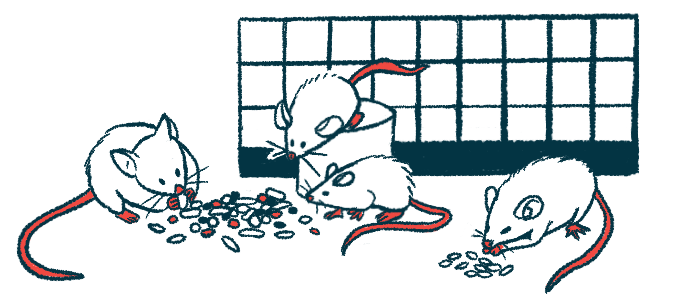Probiotic helps regulate blood sugar, insulin levels in AIP mouse model
Supplement containing Bacillus coagulans also boosted heme levels

A probiotic supplement led to improvements in blood sugar and insulin levels and increased heme production in a mouse model of acute intermittent porphyria (AIP).
“These data provide a proof of concept that probiotics, as a dietary intervention in AIP, induce relevant changes in intestinal bacteria composition and improve glucose [blood sugar] uptake and muscular energy utilization. Probiotics may offer a safe, efficient, and cost-effective option to manage people with insulin resistance associated with AIP,” the researchers wrote.
The study, “Nutritional Interventions with Bacillus coagulans Improved Glucose Metabolism and Hyperinsulinemia in Mice with Acute Intermittent Porphyria,” was published in the International Journal of Molecular Sciences.
Insulin is a hormone that helps cells to take in glucose (blood sugar) to use as a source of energy. Recent data has suggested that people with AIP may be at higher risk of developing insulin resistance, which occurs when cells don’t respond well to insulin and are unable to take in glucose from the bloodstream.
Probiotics are bacteria consumed with the aim of improving the health of the digestive tract. In this study, scientists tested whether a probiotic intervention containing a type of bacteria called Bacillus coagulans might help reduce insulin resistance in a mouse model of AIP.
“Neither probiotic- nor postbiotic-based diets have been tested for the management of AIP in previous studies,” the researchers wrote. “Given that they could be a viable treatment option for people with [insulin resistance] and overweight unable to tolerate fasting or medications due to their side effects, the aim of this work was to investigate whether nutritional interventions using B. coagulans spores can normalize metabolic alterations in a mouse model of AIP.”
In untreated AIP mice, glucose and insulin levels in the blood were abnormally high. However, researchers found that 12 weeks of supplementation with B. coagulans led to a reduction in blood sugar and insulin levels in the animals to around those seen in mice without AIP.
Analyses of the animals’ tissues and organs also showed the probiotic led to an increase in glucose uptake, mainly in skeletal muscles — those that are involved in voluntary movements. AIP mice fed the probiotic experienced an increase in lean muscle mass, and at the same time, a reduction in body fat content.
Supplement causes heme levels to rise to levels typical of healthy animals
Like other types of porphyria, AIP is characterized by defects in the production of a molecule called heme, which is required for oxygen transport in the body. Analyses of the animals’ livers showed that the B. coagulans supplement caused heme levels to rise in AIP mice to levels typically seen in healthy animals.
Analyses also suggested the probiotic led to changes in the animals’ gut microbiome — the community of bacteria and other microbes that normally live in the digestive tract. Researchers speculated the probiotic might have increased heme levels because the B. coagulans bacteria and/or other bacteria altered by the supplement might produce molecules that the body can use to help produce heme.
“Our data provide a proof of concept that [B. coagulans] probiotic, as a dietary intervention in AIP, induces relevant changes in the gut microbiota composition, reduces hyperinsulinemia [high insulin levels], and improves glucose uptake and the mobilization of fat deposits impacting the lean/fat ratio,” the researchers wrote.
They cautioned, however, that it’s difficult to make conclusions about what these experiments, done in mice under carefully controlled conditions, might mean for people with AIP. They stressed that additional studies, including trials involving human participants, will be needed to confirm the potential benefits of this probiotic.
“Future trials should be aimed at establishing timing and dosing regimens able to produce significant changes in human disease,” they wrote.







